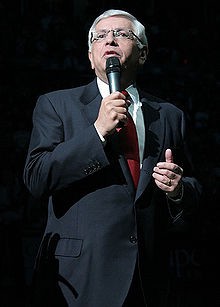Lou Reed, Documentary Filmmaker
Red Shirley, Lou Reed’s directorial debut, sounds pretty damned interesting, actually!
How Twitter And Facebook Are Changing Internet Buzz
by Bethlehem Shoals

I have never understood how critics, outside of the few tenured at operations with their heads above water, manage to make a living. I say this as someone who, for several years, more or less got by writing about music. The primary audience for criticism seems to be other critics, or at least consumers with, for lack of a better word, “critical” sensibilities. But maybe I’m denying the awesome, fundamental power of the written word. Criticism — and in this, I would include any form of review or preview — passes judgment so that others might be free, or at least spared any inconvenience.
Naturally, this is an essay about Twitter.
This fall, my friends and I had our second zany sports book published. Our first, which came out in the fall of 2008, was an unexpected hit — at least by the modest standards under which publishing operates these days. I’ve been told several times that, in today’s industry, there is no way in hell a vanity project like The Macrophenomenal Pro Basketball Almanac would ever have seen the light of day. But, owing to a snappy website, lots of pleading emails to writer friends, and some grass roots notoriety, we managed to, as they say, create buzz. It went on to sell in bookstores, but that thing was born on the Internet.
Back then, the basic unit of Internet buzz was the blog entry. Blogs, which today seem so quaint, gave you the chance to stretch out and make case for… well, whatever the oppressive world of printed matter wouldn’t give you the space to do. When it came to books, a blog post was, at minimum, a relatively stable bit of online enthusiasm. Like happy locusts, or any locusts at all, enough of them could keep you up at night, or blot out the sky. The best ones, though, were well-considered reviews that — even when they didn’t carry the imprimatur of a famous name or publication — put into circulation an account of your book by someone who had read it. Acknowledgment is one thing; that’s why authors lose sleep over landing in the NYRB. Blogs, though, allow for a wide, wide net of coercion, or if you want to be democratic about it, a variety of critical accounts.
Criticism isn’t just a way of conserving time and energy. It’s also an important translation skill. It’s easy to piece together a review that relies solely on comparisons and referents; it’s also bad writing and altogether useless for anyone who doesn’t already know the author, or run in exactly the same circles, taste-wise. A review is, in theory, helpful. That’s what language is for: it makes a movie, record, book, or film into a universal. This kind of communication is tied into consumerism, to be sure, but it’s also part of why — even as all authority comes crashing down — criticism matters. People want to understand, or be advised.
Seriously, remember when all there was to do was blog? Or when, as was the case in 2008, blogging and the space, freedom, and imagined relevance it offered were the model of Internet participation? I know that Facebook existed, and Twitter probably did, too, but there hadn’t quite been a sea change. Yet.
Buzz is a form of transmission. When blogging still held any currency, a book (like ours) would show up there in a way that anyone who happened upon it could readily understand and react to accordingly. I’m not sure if that always made for criticism, but the same principle was at play. While blogging communities did tend to work as self-contained enclaves, they still functioned in a way that would allow an outsider to latch onto their content. They may have been exclusive, but they weren’t exclusionary. Simply put, this made it a lot more likely that one post would beget another; at the very least, it increased the possibility that someone blogging about your book would lead some as-of-yet-unidentified stranger to run out and buy it.
Let me preface this by saying that our second book is doing just fine. So please don’t go reading this as sour grapes. But this fall, I’ve noticed that buzz seems harder to come by. I could blame this on the novelty quotient of our first one, but instead I’m going to blame Twitter and Facebook — in large part because I’m not the only person to feel this shift in his professional life.
As much as social networks like Twitter and Facebook are now expected to blend seamlessly into our everyday lives, help overthrow rogue nations, or bring about increased funding for worthy causes with the “like” button, their capacity for expansion — and action — depends on trust. It’s like my hypothetical all-name-drop review, but without any sign-posts that you could follow if you felt like it (or wanted to prove you were down). If the blog review belonged to any and all audiences, the “like” button, or a quick shout on Twitter, matters only as much as the author already holds credibility. Networks can merge and connect, but only with a contact point, an intersection, or an overlap. The review — which, incidentally, was never as transitory as everyone’s over-stuffed timelines — sat there and invited viewing. Tweets and status updates matter only to those already in the loop, and even then, there’s a chance they will be missed.
Of course, there are exceptions to this, but the scale is daunting. End up a trending topic, or get thousands of “likes”, and people will start to wonder what they’re missing. However, that’s a far cry from a single post being able to stir curiosity. It’s like we’re moving in the opposite direction, maybe back toward the days when a finite number of outlets made mention of a select group of works. Except now, there’s constant buzzing, with everyone empowered to weigh in. Their worth, though, depends solely on an ungodly accumulation of efforts — unless, of course, you never want to make it out of the Internet ghetto that spawned you.
Bethlehem Shoals is a founding member of FreeDarko.com and a regular contributor to NBA FanHouse. Pay attention to his book and FD’s art emporium.
It's Gonna Snow Again!
Did you hear? More snow! There’s a winter storm in effect until tomorrow evening, and they’re calling for 8–14 inches. (Yes, yes, make your jokes, children.) Snow is 1–2 so far this season, so it’s hard to know how much of the stuff that hits the ground will actually stick around, but hopefully it will brighten up all the dirty ice piles remaining from the last big storm.
David Stern Has Better Things To Do Than Defend LeBron James

There are many things that I can say about NBA commissioner David Stern, and almost every one of them is positive. He took what was the rinky-dinkiest of professional leagues and put the names on the back of the jersey ahead of the names on the front, creating a licensing mecha-Godzilla at a time when the more prominent sports associations were still selling foam fingers. His was the first league to really investigate globalization and demand that its referees not be fat pigs, while paying them well enough (except for Tim Donaghy, apparently) to not need a day job. He created the NBA dunk contest and, rumor has it, actually built Michael Jordan in an underground laboratory. He made three members of the Fab Five and two Phi Slamma Jamma graduates impossibly wealthy. And he didn’t help rig the 1985 NBA Draft Lottery to deliver Patrick Ewing to the New York Knicks, using a frozen envelope.
Sure he was a little slow to embrace the hip-hop generation (like, at the speed of never), creating a now-un-bridgeable cultural chasm between league officials and its players that manifests itself during annual All-Star Weekends filled with performances from Meat Loaf and Hall and that mustachioed dwarf. And granted, it was his idea to let ladies have their own league and we all know how that debacle turned out. But, overall, his is a brain that never stops looking for a way to modernize and improve — however soulless those twin endeavors are.
But David Stern’s mother didn’t raise a fool, either. He sees what’s happening here, reads the blogs, newspapers, and likely even has a minion or two-dozen scouring Twitter. Sure, NBA ratings are up because everyone wants a chance to verbally jihad the Heatles and their most annoying player, LeBron “I’m really John, but for all intents and purposes, call me George” James. And deep down, he knows this: the person who said that any publicity is good publicity has never come into contact with a sports league whose PR department is more sensitive than a sunburned, drunken redhead.
To the folks in the Olympic Tower on Fifth Avenue in New York City, the notion being casually disseminated to the general public is that the fans don’t actually hate human tetherball LeBron James. In the league officials’ eyes, angry fans are just joshing. They see James as a wrestling villain, and only project their hatred onto him for fun. How do I know that? I can read, can’t I?
That may be what the Commish says publicly, but privately he must be seething. This is not how he planned to spend the twilight of his illustrious career: defending a guy who manipulated the system to weaken two NBA teams and who is pretty much a boneheaded-statement vending machine. Instead, Stern wanted to prepare for what people are expecting to be a bruising collective bargaining negotiation at season’s end, which will actually only be painful for the players, because Stern is going to snap their union’s will like an Olive Garden breadstick. As he has done in the past.
Looking at the bigger picture here, James’ growing unpopularity is an issue for everyone but the man himself. He keeps saying that he doesn’t mind being booed, but…really? Has there ever been a person throughout history, other than you-know-who in Germany (yes, Michael Ballack), who doesn’t want at least a little love?
Perhaps we’ll never know the answer to that and other burning questions, and so we’ll focus on what we can completely comprehend: The Miami Heat are a pretty fearsome basketball team. James and his mentor Dwyane “I’m really George, but for all intents and purposes, call me John” Wade have learned how to share the spotlight and even the third guy (who I predicted months ago would have to buy a ticket to the All-Star game) has found crevices in the offense in which to fill. Injured players are on the road to recovery, and even the mute fans are being called out for their Miami sportsfan-itude.
And yet, if the regular season were a great predictor of post-season success, we would now be about 7 years into the reign of “King Dirk of Dallas.” Because the NBA is like the Arnold Palmer beverage of sports leagues: half good and half crappy. And so if, like the Miami Heat, you are a good team, you feast upon the terrible squads and pad your record. So when you hear statistics like the Heat have won 400 of the past 403 games, you think, sure, it’s an achievement, but regular season records don’t mean crap come playoff time, other than for home court advantage.
What does? Ask Commissioner Stern. That guy knows everything.
Tony Gervino is a New York City-based editor and writer obsessed with honing his bio to make him sound quirky. He can also be found here.
Evil Spammers Gathering Together For More Efficient Criminal Schemes
Sad news for fans of found pen1s poetry: “E-mail spam has plunged by more than half since Christmas Day when the world’s largest criminal spamming operation inexplicably shut down.” But! Experts “fear that top spamming groups might be shifting to sneakier, more lucrative online scams.” So there’s that. [Via]
Thoughts On Swine Flu, PLUS Kanye West And Jay-Z, "H.A.M."

Remember a couple years ago, how freaked out everyone was about swine flu? Well, it turns out, everyone that got it was actually really lucky (everyone who survived, I mean). According to a BBC report on a recent study in the Journal of Experimental Medicine,
“In the nine patients they studied who had caught swine flu during the pandemic, they found the infection had triggered the production of a wide range of antibodies that are only very rarely seen after seasonal flu infections or flu vaccination. Five antibodies isolated by the team could fight all the seasonal H1N1 flu strains from the last decade, the devastating ‘Spanish flu’ strain from 1918 which killed up to 50m people, plus a potentially deadly bird flu H5N1 strain. The researchers believe the ‘extraordinarily’ powerful antibodies were created as the body learned how to fight the new infection with swine flu using its old memory of how to fight off other flu viruses.”
This reminds me of the time when I was in college when my friend Todd told me that smoking “a couple of cigarettes a day” was actually good for you because it was like “exercise for your lungs.” (He had heard this from someone as he followed the Grateful Dead tour the previous summer.) It also seems a little bit like Ross Douthat’s argument that racism and intolerance actually makes America a better country. Except that this is probably true? Y’know, like Kanye said. (That’s an original Kanye quote, right?)
Thinking back, 2009 swine flu might have been the greatest global pandemic of all time!
Oh, also, Kanye’s new song with Jay-Z came out today. It’s called “H.A.M.” Here it is, if you’d like to listen to it.
Shooting Victims Downgraded
“The only thing more shameful than the tragedy in Arizona right now is the reaction of congressional Democrats who are using the attempted assassination of a colleague for the most base of political purposes. And the real victim here — if they have their way — will be the free speech rights of all Americans.”
— Yeah, that. Also, probably, all the dead and wounded. But sure. [Via]
Emergency Medical Services Groan Under Strain Of Expanding Population

“With a 300-pound patient, it’s not too bad, or even 400 pounds. But to be honest with you, with a 500-, 600-, 700-pound patient — it’s just too much for you.’’
— Boston EMS captain Jose A. Archila addresses the difficulties of ferrying the growing number of morbidly obese patients to the hospital. Boston, where rescue crews are increasingly tasked with transporting patients weighing at least 450 pounds, has now retrofitted one of its ambulances with a hydraulic lift to ease the burden. It’s a testament to our can-do spirit, and our inability to stop putting things in our mouths.
Maritime Disasters Fade Into The Past
Audrey Lawson-Johnston, the last survivor of the sinking of the Lusitania in 1915, has died at the age of 95. When I was a boy (sorry) we learned about the great watercraft calamities as part of our education in history. I can still reel off some of the names (the Lusitania, the Maine, the Andrea Doria, the Titanic, etc.). I suspect that in the future all that people will remember is the boat crash that killed Leo where the old lady dropped it in the ocean at the end. Flight numbers are our new sunken ships. It’s progress, I guess.
UK Hero Spy Cop Turns Hard Green

Have you been following the Mark Kennedy story? It’s the UK’s own mini-COINTELPRO scandal, except far more British and polite and with a kind of happy ending (so far). Cop Kennedy posed as an XTREME GREENIE, to quote Sarah Palin, for seven years — and then, when his environmental activist “friends” discovered that he was a cop, he copped to it, turned green (“went native” in the parlance) and upset the trial of the greenies so they all walked free and also quit his job and coughed up the name of at least one other undercover cop. In the United States, we’ve never discovered the full and extreme extent to which citizen organizations were invaded and subverted; in the UK, actual cops politicians who serve on the board of the Metropolitan are all like, wow, yeah, that was a dumb idea: “picking on a bunch of non-violent environmental protesters seems like a clear waste of money.” (Meanwhile, on the homefront? An energy lobbyist was found dead in her own D.C. garage in her burning car. Her husband “is the White House’s deputy director of legislative affairs.” That’s both terrible and odd.)
